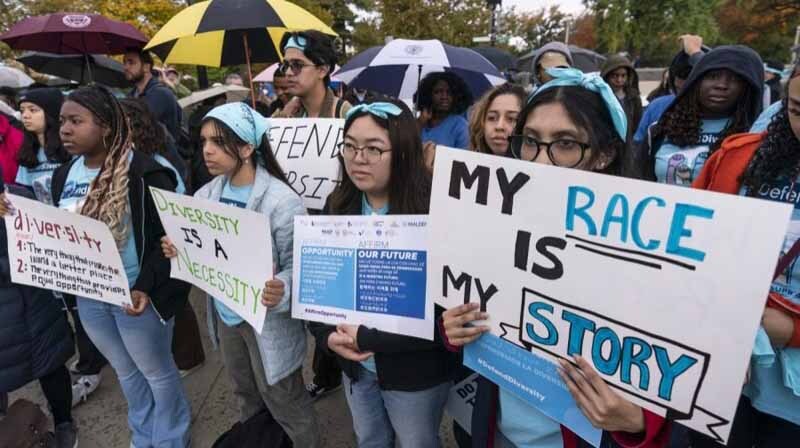 News Staff
News Staff![]() -
June 29, 2023 -
Education -
SUPREME COURT ENDING AFFIRMATIVE ACTION IN HIGHER EDUCATION
-
3.7K views -
0 Comments -
0 Likes -
0 Reviews
-
June 29, 2023 -
Education -
SUPREME COURT ENDING AFFIRMATIVE ACTION IN HIGHER EDUCATION
-
3.7K views -
0 Comments -
0 Likes -
0 Reviews

DLNews/JTFMax Education:
The recent decision by the Supreme Court to eliminate affirmative action in higher education has raised concerns about its potential negative impact on many young students. Additionally, the involvement of a conservative activist group, Students for Fair Admissions, led by Ed Blum, in the Harvard and University of North Carolina cases has added to the controversy surrounding the ruling and its perceived unfairness.
Affirmative Action in the 21st Century
Some legal experts had predicted that the Supreme Court would no longer permit affirmative action in higher education. This was due to the Court overturning a precedent that had allowed universities to consider race when selecting students and to offer preference to minority students who had outperformed their white peers. Although the precedents were not explicitly annulled, Justice Roberts and Justice Clarence Thomas clarified that the majority's analysis made them outdated.
In cases brought by the conservative advocacy group Students for Fair Admissions, the Court voted 6-3 to eliminate race-based admissions policies at Harvard and the University of North Carolina. Justice Ketanji Brown Jackson recused herself from the Harvard case because of her previous role on the school's board of overseers.
The decision is expected to challenge colleges to find new ways to promote diversity, but this may not be easy. The ruling is predicted to significantly impact women of color, who have historically had lower academic performance than their white counterparts.
The Court’s Decision
College presidents quickly weighed in, most expressing disappointment but resolving to continue diversity efforts. In a campus message, Rice University’s Reginald DesRoches wrote, "The law may change, but our commitment to inclusion will not.”
Justice Sonia Sotomayor, who penned the court’s dissenting opinion, accused her colleagues of closing doors of opportunity with their decision. “This Court is striking out at a door that this court’s precedents helped to open, and in doing so, it closes the path of opportunity for students of every background,” she wrote.
The court ruled that Harvard and the University of North Carolina violated the Constitution with race-conscious admissions policies. Its 6-3 lead on the University of North Carolina case and 6-2 decision on Harvard, with Chief Justice John Roberts writing the majority opinion in both, upended decades of Supreme Court jurisprudence on affirmative action. But it did leave a small window for colleges to consider applicants’ racial identities in admission decisions.
The Impact
In its 6-3 decision Thursday in the Harvard and University of North Carolina cases, the Supreme Court upended decades of legal precedent by ruling that colleges may no longer consider race part of their admissions process. It will be harder for selective universities to build undergraduate classes that resemble the nation’s demographics or to compensate for structural racism that keeps students from more disadvantaged backgrounds from attending college in the first place.
Justice Clarence Thomas and Justice Sonia Sotomayor wrote that the ruling effectively overturns prior decisions authorizing affirmative action, even though Roberts’ opinion did not expressly say so. He left open the possibility that schools could consider how race affected a student’s life — something he suggested might be appropriate in an application essay, for example –. Still, they can no longer use their admissions policies to “establish through surreptitious means the regime we hold unlawful today.”
The cases are the latest blow against long-standing court precedent, which has been increasingly endangered under President Donald Trump’s three appointees. The court’s conservative majority recently overturned Roe v. Wade, and its upcoming decisions will affect everything from employment to government contracting.
Conclusions
The recent ruling by the Supreme Court in the Harvard case was decided with a 6-3 vote, with Justice Jackson recusing herself due to prior involvement. While Justices Kagan and Sotomayor expressed dissent, Chief Justice Roberts, in the majority opinion, did not explicitly overturn past decisions. Nonetheless, the ruling may make it more challenging for colleges and universities to consider race when evaluating admissions, except for military academies, due to their unique national security interests. This decision has raised concerns among diversity advocates in higher education, as it may impact future affirmative action policies in employment, housing, and government contracting.

Desert Local News is an invitation-only, members-based publication built on fact-checked, non-biased journalism.
All articles are publicly visible and free to read, but participation is reserved for members—comments and discussion require an invitation to join.
We cover local, state, and world news with clarity and context, free from political agendas, outrage, or misinformation.